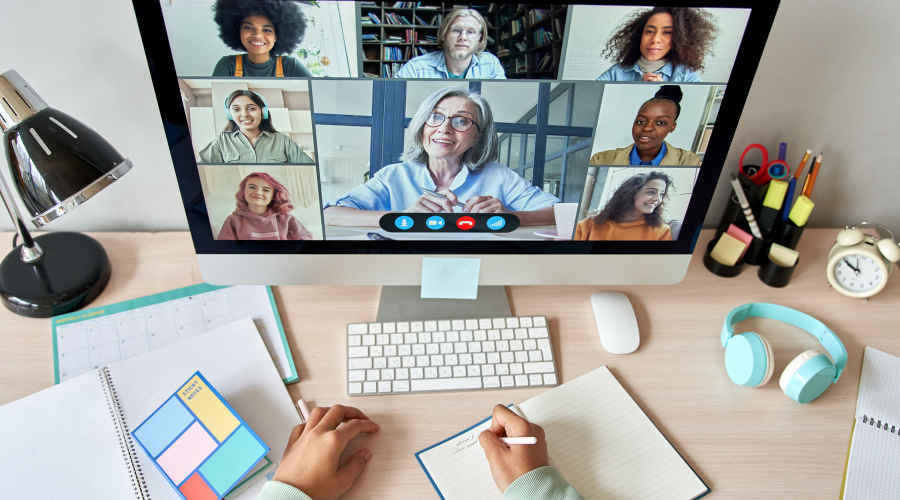Engage Your Audience, Please
Recently I went to a webinar on 'how people learn'. The first slide stated "people learn by doing," and the last slide said "don't give a lecture." Yet the 45 minute webinar was a lecture with no interaction with the attendees and certainly no learning by doing.
This was especially ironic because of the topic, and the message, but is true of so many webinars. What is stopping people from making online webinars engaging?
Hi, we are Happy
We are leading a movement to create happy, empowered and productive workplaces.
How can we help you and your people to find joy in at least 80% of your work?

The webinar company GoTo, who can tell if the audience has moved away onto other software, reckons that participants in webinars are, on average, only paying attention a third of the time.
Online it is so tempting to do something else, to — for instance — check your email.
You can see people doing it. Long introductions, people are straying to their emails. Reading off slides or simply being dull, it's email time. Questions to the whole group, rather than getting people into breakouts, some people will go to their email.
Here's my test: In your next online session, can you split your audience into pairs in breakouts and know that everybody will have somebody to talk to?
I guess there are two approaches that people take:
- I'm going to give my talk and if people want to hear it they will, it's up to them
- I'm going to seek to actively engage my audience so they fully get the message
I go with the second option. I want people not just to hear what I say, not just to find it memorable (which stories enable) but to relate it back to their own lives and work. And for that you need interaction, you need people to be able to work through their thoughts.
In our face-to-face conferences, I always made sure that nobody spoke for longer than 9 minutes, before giving people a chance to discuss at their tables. (The speaker would generally get a second 9 minutes afterwards and then more discussion.)
People left engaged and inspired because they weren’t simply watching people talk and experiencing death-by-PowerPoint.
Online it is even more important to keep those presentations short. And online can be even more engaging than real life. Our virtual conference last year was rated the most engaging conference we had ever held.
We have the tools. We have breakouts that enable people to relate what they have heard to themselves, to debate and discuss it.
We have chat interaction. We have Jamboard, Miro or Mural to enable people to move post-its around the screen. We have Slido or Mentimeter for polls and word clouds and the ability to vote questions up and down.
And we have Google Docs and Google Sheets (or Word and Excel) to quickly capture information from the whole audience.
And the feedback indicates that introverts as well as extroverts — as long as the breakouts are small enough — also value the opportunity to talk about what they've heard.
Give people a minute for silent reflection before going into the breakouts and it works even better.
What is getting in the way? Why are so many webinars so unengaging?
Keep informed about happy workplaces
Sign up to Henry's monthly Happy Manifesto newsletter, full of tips and inspiration to help you to create a happy, engaged workplace.

Learn the 10 core principles to create a happy and productive workplace in Henry Stewart's book, The Happy Manifesto.
Henry's Most Popular Blogs
- 8 Companies That Celebrate Mistakes
- 9 Benefits of Having Happy Employees
- 321Zero: How I Solved my Email Overload
- 16 Companies That Don't Have Managers
- 5 Big Companies Who Swear by Mindfulness
- 49 Steps to a Happy Workplace
- A Four Day Week? Let's Start With a Four Day August
- Google: Hire Great People and Give Them Lots of Autonomy
- Buurtzorg: No Managers, Just Great Care From a Nurse-Led Service
- 30 Steps to Joy at Work: Get More Done by Being Less Busy

Henry Stewart, Founder and Chief Happiness Officer
Henry is founder and Chief Happiness Officer of Happy Ltd, originally set up as Happy Computers in 1987. Inspired by Ricardo Semler’s book Maverick, he has built a company which has won multiple awards for some of the best customer service in the country and being one of the UK’s best places to work.
Henry was listed in the Guru Radar of the Thinkers 50 list of the most influential management thinkers in the world. "He is one of the thinkers who we believe will shape the future of business," explained list compiler Stuart Crainer.
His first book, Relax, was published in 2009. His second book, the Happy Manifesto, was published in 2013 and was short-listed for Business Book of the Year.
You can find Henry on LinkedIn and follow @happyhenry on Twitter.
Next Conference: 2025 Happy Workplaces Conference
Our Happy Workplaces Conference is our biggest event of the year, and we'd love for you to join us on Thursday 12th June!
This year's event will be held at Happy's HQ in Aldgate, central London.
We may also offer a hybrid option for people to join us online simultaneously — do let us know if you are interested in joining online and we can add you to the waiting list.
As always, our next conference will be filled with interaction, discussion and space for reflection.
Related courses
The Happy Leadership Programme
Brave Leadership: One-Year Leadership Development Programme for Women
Level 7 Senior Leadership Apprenticeship Programme
Not what you need? Take a look at all of our off-the-shelf Leadership and Management programmes.